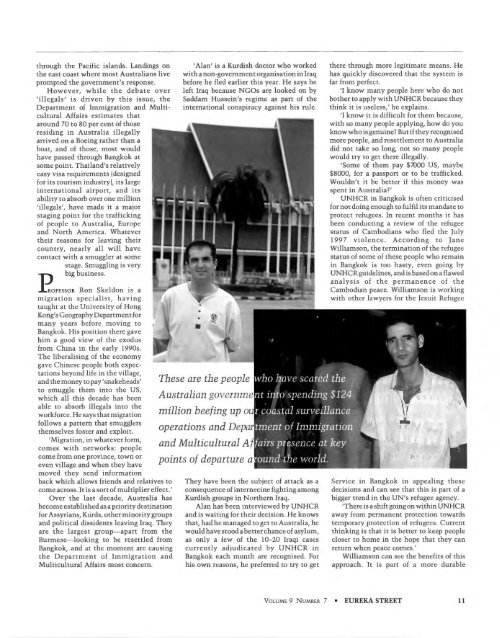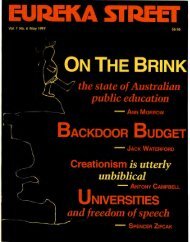1 - Eureka Street
1 - Eureka Street
1 - Eureka Street
- No tags were found...
You also want an ePaper? Increase the reach of your titles
YUMPU automatically turns print PDFs into web optimized ePapers that Google loves.
through the Pacific islands. Landings onthe east coast where most Australians liveprompted the government's response.Howeve r, while the debate over'illegals' is driven by this issue, theDepartment of Immigration and MulticulturalAffairs estimates thataround 70 to 80 per cent of thoseresiding in Australia illegallyarrived on a Boeing rather than aboat, and of those, most wouldhave passed through Bangkok atsome point. Thailand's relativelyeasy visa requirements (designedfor its tourism industry), its largeinternational airport, and itsability to absorb over one million'illegals', have made it a majorstaging point for the traffickingof people to Australia, Europeand North America. Whatevertheir reasons for leaving theircountry, n early all will havecontact with a smuggler at som estage. Smuggling is veryn big business.L oFESSOR Ron Skeleton is amigration specialist, h avingtaught at the University of HongKong's Geography Department form any years before m oving toBangkok. His position there gavehim a good view of the exodusfrom China in the early 1990s.The liberalising of the economygave Chinese people both expectationsbeyond life in the village,and the money to pay' snakeheads'to smuggle them into the US,which all this decade has beenable to absorb illegals into theworkforce. He says that migrationfollows a pattern that smugglersthem selves foster and exploit.'Migration, in whatever form,comes with n etworks: peoplecome from one province, town oreven village and when they havemoved they send informationba ck which allows friends and relatives tocome across. It is a sort of multiplier effect.'Over the last decade, Australia hasbecome established as a priority destinationfor Assyrians, Kurds, other minority groupsand political dissidents leaving Iraq. Theyare the largest group-apart from theBurmese-looking to be resettled fromBangkok, and at the moment are causingthe D epartment of Immigration andMulticultural Affairs most concern.'Alan' is a Kurdish doctor who workedwith a non-government organisation in Iraqbefore he fled earlier this year. He says heleft Iraq because NGOs are looked on bySaddam Hussein's regime as part of theinternational conspiracy against his rule.Australian govermillion beefing upoperations and Deand Multicultural Apoints of departure aThey have been the subject of attack as aconsequence of internecine fighting amongKurdish groups in Northern Iraq.Alan has been interviewed by UNHCRand is waiting for their decision. He knowsthat, had he managed to get to Australia, hewould have stood a better chance of asylum,as only a few of the 10-20 Iraqi casescurrently adjudicated by UNHCR inBangkok each month are recognised. Forhis own reasons, he preferred to try to getthere through more legitimate means. Hehas quickly discovered that the system isfar from perfect.'I know many people here who do notbother to apply with UNHCR because theythink it is useless,' he explains.'I know it is difficult for them because,with so many people applying, how do youknow who is genuine? But if they recognisedmore people, and resettlem ent to Australiadid not take so long, not so many peoplewould try to get there illegally.'Some of them pay $7000 US, m aybe$8000, for a passport or to be trafficked.Wouldn't it be better if this m oney wasspent in Australia ?'UNHCR in Bangkok is often criticisedfor not doing enough to fulfil its mandate toprotect refugees. In recent m onths it hasbeen conducting a review of the refugeestatus of Cambodians who fl ed the July199 7 violence. According t o JaneWilliamson, the termination of the refugeestatus of som e of these people who remainin Bangkok i too hasty, even going byUNHCRguidelines, and is based on a flawedanalysis of the p ermanence of theCambodian peace. Williamson is workingwith other lawyers for the Jesuit RefugeeService in Bangkok in appealing thesedecisions and can see that this is part of abigger trend in the UN's refugee agency.'There is a shift going on within UNHCRaway from permanent protection towardstemporary protection of refugees. Currentthinking is that it is better to keep peoplecloser to home in the hope that they canreturn when peace com es.'Williamson can see the benefits of thisapproach. It is part of a more durableV OLUME 9 N UMBER 7 • EUREKA STREET 11
















